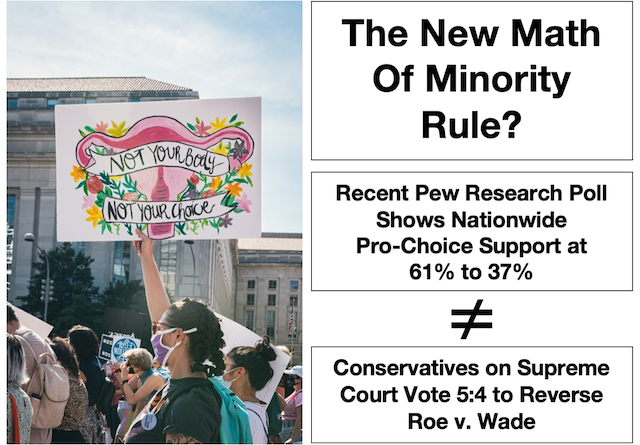Missing the Point: The problem is minority rules
So, as a result of the Trump era appointments to the Supreme Court, Roe v. Wade is no more. The five to four vote was not an academic one, independent of the religious beliefs and political involvements of the Justices. It was, flat out for the five justices who voted Roe down, a personal statement.
To put it mildly, the reversal of Roe is problematic. It’s a hot mess of backward thinking that is profoundly unfair and outright hurtful, both figuratively and literally. It’s all that, but it’s not the problem. The Court’s decision is symptomatic of something much more profound and insidious.
My appreciation of our democracy began at Germanton Elementary in Annapolis where I learned two concepts that stuck. It’s a free country and the majority rules.
From the very beginning, even as a kid, I understood that there would be times when I would be in the minority, when things wouldn’t go my way. I would just have to get over it and I was okay with that. Growing up, I’ve come to believe that with a well-informed, reasonably open-minded population, and as a country with freedom of speech and an independent media, America would generally end up doing the right thing. The process might not always be pretty, but eventually a consensus will form that is wise and generally progressive.
So how is it that, in a county where those who are pro-choice out number their opponents by 61 to 37 by one recent poll, the minority gets to make the rules? The simple answer is that potentially fatal flaws in our political system have allowed the relatively few to game the process. “Majority rule” may be a concept to teach little kids but, increasingly so, that’s not the way it works.
For one thing, we’ve allowed state legislatures to gerrymander election districts to elect officials who lack majority popular support. …The solution to Republican gerrymandering isn’t to gerrymander with a Democratic bias. It’s to codify district definitions that are mathematical and apolitical.
For another, we’ve allowed turnout to fall below the minimum levels necessary to assure that votes cast reflect majority points of views. …The solution to low turnout is to make it easier, not harder, to vote and maybe even required by law.
Third, we’ve failed to make essential changes to the election process itself with the result that the candidates the parties nominate and the officials we elect are often anointed by no more than a small, sometimes tiny minority of registered voters – and by big money skillfully deployed for the benefit of special interests. One solution to electing candidates for whom well less than 50% of the people have voted is election reform that makes the primary an all-party event and the general election a runoff between the two leading candidates, even if they’re from the same party.
And we’ve allowed monied interests to be way, way too influential in the process of who runs for office and who we elect.
The 2020 Democratic primary election for Mayor of Baltimore
The City of Baltimore is a Democratic town. According to the Maryland Board of Elections, in 2020 the city had only 30,163 registered Republicans to 311,610 registered Democrats. Generally speaking, whoever wins the Democratic primary wins the general election.
In the 2020 Democratic primary, 24 candidates ran for Mayor. Of these 24 candidates, only 6 received 5 or more percent of the vote. Only 4 received 10 or more percent.
Brandon Scott – arguably the least effective Mayor Baltimore has had in recent memory – received just 29.6% of the votes cast. Put another way, 70.4% – more than a two-thirds majority of the Democrats who voted – wanted someone else to lead the city’s government.
Total turnout was for the Democratic primary was only 47.6% of registered Democrats. Of total registered Democratic voters, only 14.1% voted to nominate Mr. Scott. And that was enough to elect him Mayor, even though 85.9% of the city’s registered Democrats either did not vote or preferred another candidate.
Of the 24 candidates running, a majority of 54.6% of the vote was cast, collectively, for former Mayor Sheila Dixon, Mary Miller and Thiru Vignarajah. It’s a good bet that, in a runoff election against Ms. Dixon, Mr. Scott would have been soundly defeated. For what it’s worth, Mary Miller was the candidate the city should have elected.
Unfortunately, this is how elections work almost everywhere in our country. With surprisingly few exceptions, majority preferences have nothing to do with the outcome of our elections. Now ask yourself, are you even the least bit surprised that, even with substantial majority support, the pro-choice movement just lost in the Supreme Court and can’t get supportive legislation passed in Congress or in many state legislatures around the country?
Until we fix gerrymandering, increase voter turnout and change the rules of our elections so that winners have majority support – and get big money out of politics – small, well-funded minorities will have greatly disproportionate influence on our government and the lives of our people.
Don’t fix them? Let ourselves be distracted by the specifics of a given issue – no matter how awful and troublesome – and the consequences of unresponsive, non-representative government are going to stay with us and only get worse.
In the meantime, minority rules.

Les Cohen is a long-term Marylander, having grown up in Annapolis. Professionally, he writes and edits materials for business and political clients from his base of operations in Columbia, Maryland. He has a Ph.D. in Urban and Regional Economics. Leave a comment or feel free to send him an email to Les@Writeaway.us.

